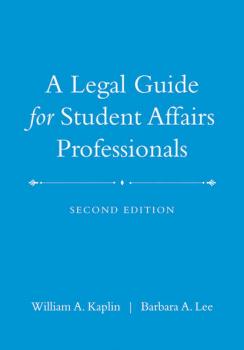ТОП просматриваемых книг сайта:















Barbara Lee A.
Список книг автора Barbara Lee A.Аннотация
The student affairs market has experienced a great boom in the last decade. Based on the fourth edition of the indispensable guide to the laws that bear on the conduct of higher education, this updated student affairs edition provides a reference and guide for student affairs practitioners and graduate students in student affairs administration courses. This volume combines sections that are pertinent to student affairs practitioners, as well as the government regulatory and administrative issues found in the full Fourth Edition. It is thus the most comprehensive and easy-to-use volume for student affairs officers and students.
Аннотация
Tension in the Tank meets us where we are on a faith journey that includes doubt and pain. Here is a voice that speaks to the beauty and value of interfaith understanding and liberal social values while digging deep into the heart of Christian mysticism. If we are living a spirituality that matters, it will affect the way we treat ourselves and the way we treat each other. Tension in the Tank is about faith that is relevant, secure, and ever-evolving. It is a guidebook for building meaningful relationships with Spirit, self, and each other. Radically open to possibility and wonder, Tension in the Tank offers the opportunity and the challenge to live our faith in such a way that the walls between us come down and we become pursuers and enactors of universal justice.
Аннотация
Make sure you have a copy on your bookshelf. The Law of Higher Education, Fifth Edition, is the most up-to-date and comprehensive reference, research source, and practical legal guide for college and university administrators, campus attorneys, legal counsel, and institutional researchers, addressing all the major legal issues and regulatory developments in higher education. In the increasingly litigious environment of higher education, William A. Kaplin and Barbara A. Lee’s clear, cogent, and contextualized legal guide proves more and more indispensable every year. Over 3,000 new cases related to higher education have been decided since the publication of the previous edition, and scores of changes to higher education law are made each year. Every section of the fifth edition contains new material, including those related to: Hate speech and free speech rights of faculty in public universities Sharing of research with international colleagues Intellectual property and peer-to-peer file sharing Student suicide Campus safety Police and administrators’ right to search students’ residence hall rooms Governmental support for religious institutions and religious autonomy rights of individual public institutions Collective bargaining and antidiscrimination laws Nondiscrimination and affirmative action in employment, admissions, and financial aid Family and Medical Leave Act and workers’ compensation FERPA (Family Educational Rights and Privacy Act)
Аннотация
Based on the fifth edition of Kaplin and Lee’s indispensable guide to the law that bears on the conduct of higher education, The Law of Higher Education, Fifth Edition: Student Version provides an up-to-date textbook, reference, and guide for coursework in higher education law and programs preparing higher education administrators for leadership roles. The Student Version includes the materials from the full fifth edition that most relate to student interests and are most suitable for classroom instruction. For example: The evolution of higher education law and governance Legal planning and dispute resolution The relationship between law and policy Faculty and staff employment issues, including collective bargaining Academic freedom for faculty and students Copyright basics The contract rights of students Legal issues in online education The rights of students and faculty with disabilities Campus issues: safety, registered sex offenders, racial and sexual harassment, student suicide, campus computer networks, searches of students’ residence hall rooms Hate speech and freedom of speech, including the rights of faculty and students in public universities Student organizations’ rights, responsibilities, and activities fees Governmental support for religious institutions and religious autonomy rights of individuals in public institutions Nondiscrimination and affirmative action in employment, admissions, and financial aid Athletics and Title IX FERPA (Family Educational Rights and Privacy Act) Each chapter is introduced with an overview of key terms and ideas the students will encounter. In addition, the book includes a general introduction to the study of higher education law, a glossary of key legal terms, and appendices for non-law students on the American court system and on how to read court opinions. The authors have also prepared a volume of teaching materials keyed to the Student Version, available from the National Association of College and University Attorneys (NACUA). In addition, the authors will periodically update the Student Version by posting recent developments on a Web site hosted by NACUA.




